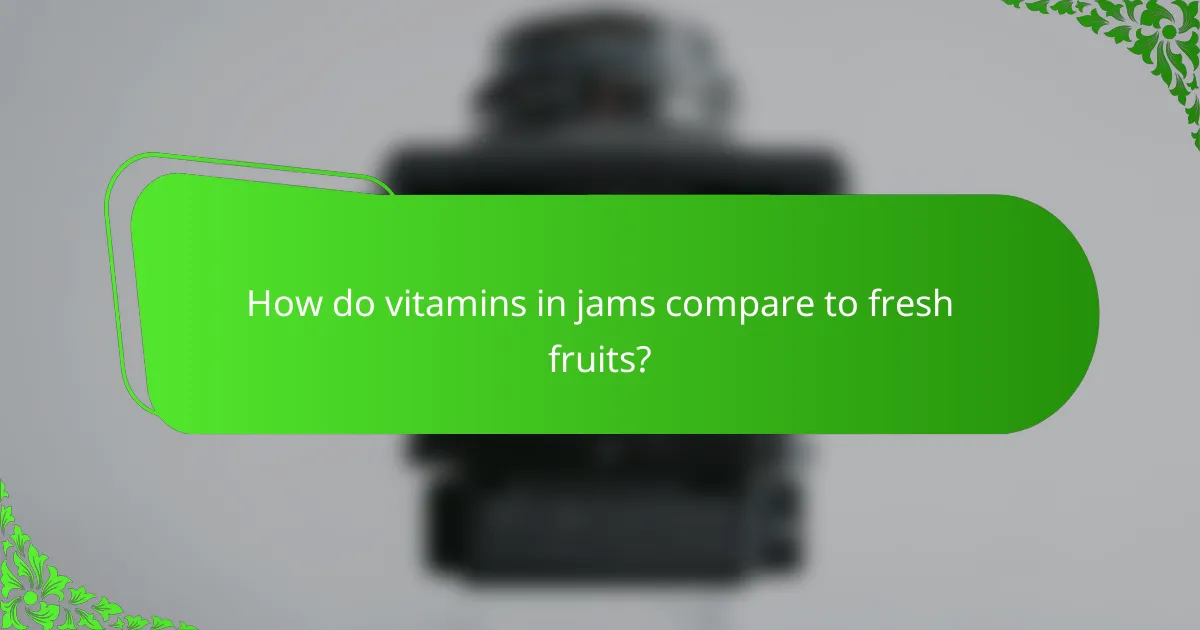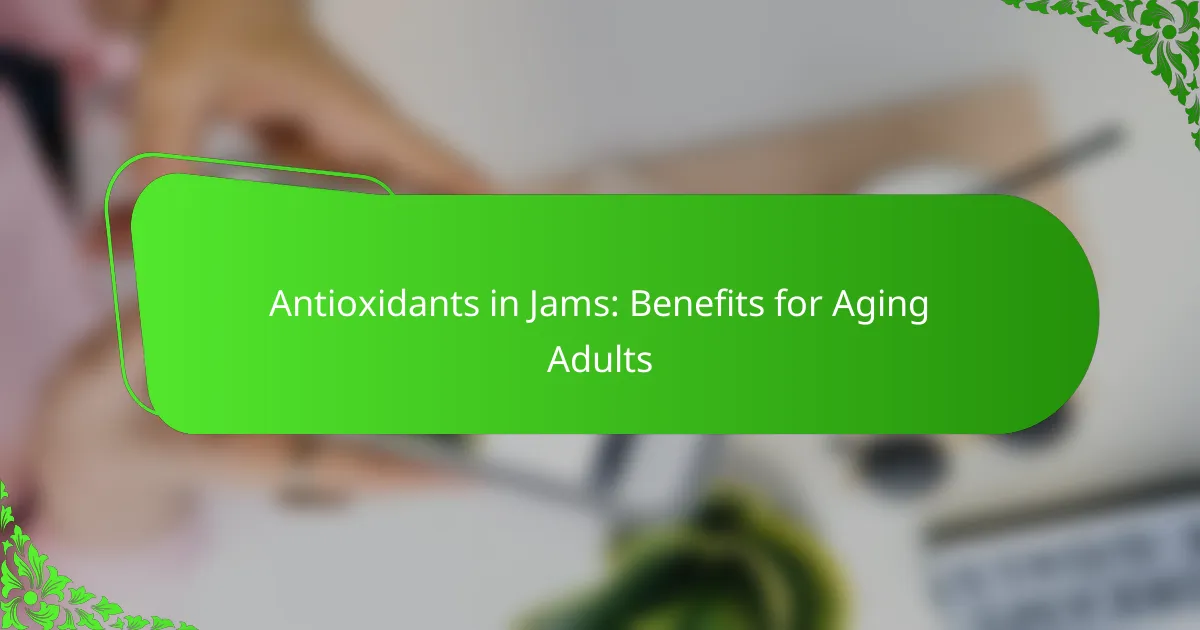Jams made from specific fruits can be a delicious source of essential vitamins, particularly vitamin C and various B vitamins. Varieties such as strawberry, blueberry, raspberry, blackcurrant, and peach not only enhance flavor but also offer notable nutritional benefits, although their vitamin content may differ from that of fresh fruits due to processing methods. Understanding the vitamin profiles of different jams can help you choose the most nutritious options for your diet.

Which jams have the highest vitamin content?
Jams made from certain fruits are rich in vitamins, particularly vitamin C and some B vitamins. Strawberry, blueberry, raspberry, blackcurrant, and peach jams are among the varieties that offer significant nutritional benefits.
Strawberry jam
Strawberry jam is a popular choice due to its high vitamin C content, which can range from 30 to 60 mg per 100 grams. This vitamin is essential for immune function and skin health. Additionally, strawberries contain antioxidants that may help reduce inflammation.
When selecting strawberry jam, look for options that use real fruit and minimal added sugars to maximize nutritional value. Homemade versions can also retain more vitamins compared to commercially processed jams.
Blueberry jam
Blueberry jam is known for its high levels of antioxidants, particularly anthocyanins, which contribute to heart health. It typically contains around 10 to 20 mg of vitamin C per 100 grams. This jam can also provide dietary fiber, aiding digestion.
Opt for blueberry jams that are made with whole blueberries and less sugar to enhance their health benefits. Consider pairing it with whole grain bread for a nutritious breakfast option.
Raspberry jam
Raspberry jam is rich in vitamin C, offering approximately 30 to 50 mg per 100 grams. It also contains dietary fiber and various antioxidants that support overall health. Raspberries are known for their potential benefits in weight management and blood sugar control.
Choose raspberry jams with high fruit content and low sugar for the best health benefits. They can be a delightful addition to yogurt or oatmeal, boosting both flavor and nutrition.
Blackcurrant jam
Blackcurrant jam stands out for its exceptionally high vitamin C levels, often exceeding 100 mg per 100 grams. This fruit is also a good source of vitamin A and essential fatty acids, contributing to eye health and skin vitality.
When buying blackcurrant jam, prioritize those made with whole fruit and minimal preservatives. This ensures you get the maximum nutritional impact while enjoying its rich, tart flavor.
Peach jam
Peach jam offers a moderate vitamin C content, generally around 10 to 20 mg per 100 grams. Peaches are also a source of vitamins A and E, which are important for skin health and immune function. The natural sweetness of peaches makes this jam a favorite for many.
For healthier options, select peach jams that contain little added sugar or consider making your own at home. Peach jam pairs well with cheese and can elevate a simple snack or dessert.

What vitamins are commonly found in jams?
Jams typically contain several vitamins, with Vitamin C, Vitamin A, Vitamin K, and B vitamins being the most common. The nutritional value of jams can vary significantly based on the fruit used and the preparation methods, making some varieties more beneficial than others.
Vitamin C
Vitamin C is a powerful antioxidant found in many fruits used for making jams, such as strawberries, raspberries, and citrus fruits. This vitamin supports the immune system, promotes skin health, and aids in the absorption of iron from plant-based foods.
When choosing jams, look for those made from fruits high in Vitamin C to maximize health benefits. A serving of jam made from these fruits can provide a significant portion of the daily recommended intake of Vitamin C.
Vitamin A
Vitamin A is essential for vision, immune function, and skin health, and it can be found in jams made from fruits like apricots and peaches. This vitamin is crucial for maintaining healthy vision and supporting cellular communication.
To enhance your Vitamin A intake, consider jams that use orange or yellow fruits, as they typically contain higher levels of this nutrient. A small serving can contribute to your daily Vitamin A needs.
Vitamin K
Vitamin K plays a vital role in blood clotting and bone health and is present in smaller amounts in certain fruit jams, particularly those made from berries. While not as abundant as other vitamins, it still contributes to overall health.
For those looking to increase their Vitamin K intake, jams made from blackberries or blueberries can be a tasty option. Including these jams in your diet can help support your body’s needs for this important vitamin.
B vitamins
B vitamins, including B1 (thiamine), B2 (riboflavin), B3 (niacin), and B6, can also be found in various fruit jams, although in smaller quantities. These vitamins are essential for energy production, brain function, and the metabolism of fats and proteins.
To benefit from B vitamins, choose jams made from a variety of fruits, as a diverse fruit selection can enhance the overall nutrient profile. Pairing jam with whole grain bread can further boost your intake of these essential vitamins.

How do vitamins in jams compare to fresh fruits?
Vitamins in jams generally differ from those in fresh fruits due to processing methods and concentration levels. While jams can retain some nutrients, they often contain lower amounts of certain vitamins compared to their fresh counterparts.
Concentration differences
The concentration of vitamins in jams can vary significantly based on the type of fruit used and the sugar content. For example, jams made from berries may have higher levels of vitamin C compared to those made from apples. However, the overall vitamin content is typically lower than that found in fresh fruits, as the cooking process can reduce nutrient levels.
In many cases, jams contain added sugars which can dilute the nutrient density. It’s essential to check labels for vitamin content, as some brands fortify their products to enhance nutritional value.
Nutrient retention during processing
Nutrient retention in jams is influenced by the cooking time and temperature. Prolonged heating can lead to significant losses of heat-sensitive vitamins like vitamin C and some B vitamins. Typically, the longer the cooking process, the greater the nutrient degradation.
To maximize nutrient retention, look for jams that are minimally processed or made with lower cooking times. Homemade jams can also be a better option, as they allow for control over ingredients and cooking methods, potentially preserving more vitamins.

What factors affect the vitamin content in jams?
The vitamin content in jams is influenced by several factors, including the type of fruit used, the methods of processing, and any additional ingredients added. Understanding these aspects can help you choose jams with higher nutritional value.
Fruit variety
The type of fruit selected for jam significantly impacts its vitamin content. Fruits like strawberries, blueberries, and blackberries are known for their high levels of vitamins C and K, while citrus fruits provide a substantial amount of vitamin C. Choosing organic or locally sourced fruits can also enhance the nutritional profile due to their freshness.
Different varieties of the same fruit can have varying vitamin concentrations. For example, wild blueberries typically contain more antioxidants and vitamins compared to cultivated ones. When selecting jams, look for those made from high-vitamin fruit varieties to maximize health benefits.
Processing methods
Processing methods can greatly affect the retention of vitamins in jams. Traditional methods, such as slow cooking, may preserve more nutrients compared to high-heat pasteurization. However, longer cooking times can lead to nutrient loss, particularly for heat-sensitive vitamins like vitamin C.
Some manufacturers use techniques like flash pasteurization, which can help maintain a higher vitamin content. When purchasing jams, consider those that specify minimal processing or use methods that retain nutrients effectively.
Added ingredients
Additional ingredients can either enhance or diminish the vitamin content of jams. For instance, adding natural fruit pectin can improve the texture without compromising nutrition. However, excessive sugar or artificial preservatives may dilute the overall vitamin profile.
When selecting jams, look for options with minimal added sugars and no artificial additives. Reading labels can help you identify products that prioritize fruit content and maintain higher nutritional value.

How to choose the healthiest jams?
To choose the healthiest jams, focus on those with minimal added sugars, whole fruit ingredients, and organic certifications. These factors contribute to a higher nutritional value and better overall health benefits.
Check for added sugars
When selecting jams, it’s crucial to check for added sugars, as many products contain high levels that can negate health benefits. Aim for jams that list fruit as the first ingredient and have little to no added sugars, ideally under 5 grams per serving.
Be aware that some brands may use alternative sweeteners, which can be misleading. Always read the nutrition label to understand the total sugar content and avoid those with excessive sweeteners.
Look for whole fruit ingredients
Choosing jams made from whole fruit ingredients ensures you are getting the maximum nutritional value. Whole fruit preserves more vitamins, minerals, and fiber compared to those made from fruit purees or concentrates.
Look for labels that specify “made with whole fruit” or “fruit chunks” to ensure you are consuming a product that retains the natural benefits of the fruit. This can enhance both flavor and health benefits.
Consider organic options
Opting for organic jams can reduce exposure to pesticides and additives, making them a healthier choice. Organic certifications ensure that the fruit used is grown without synthetic fertilizers or harmful chemicals.
While organic jams may be slightly more expensive, the health benefits and peace of mind often justify the cost. Check for USDA Organic labels or similar certifications in your country to ensure authenticity.










